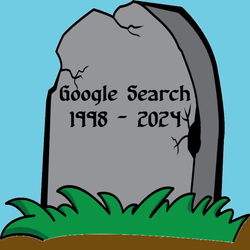The WWW declares the end of Google
Reprinted with permission from Cyber|Show.
Figure 1: "All good things must pass"
After seeing how far Google search had come from the original WWW page, I recently wrote in the Times Higher Education on the demise of coherent and reproducible research methods in universities around the world.
Seemingly for years, Google search has been in decline, like this Reddit post of Philip K. Fry is typical, as it notes;
…in recent months Google search has become increasingly useless. Key search terms are ignored completely as are search operators such as quotation marks, plus and negative signs, etc. Even switching to verbatim rarely helps.
We've long been familiar with Google's callous, almost anti-intellectual and anti-humanist relation to the value of knowledge and culture by it's willingness to put advertisers' opinions above common facts and to ride roughshod over the values of its users as seen in the famous Google Graveyard.
Research now confirms it. A longitudinal study of SEO search engine spam by Leipzig University shows Google search returns low-quality nonsense generated by AI robots.
For me, a better take by The Atlantic is simply that the Web Grew Up. Anyway, finally in 2024 Google made it official; it's splitting up with "The World Wide Web". Or rather, like someone sensing they are about to be dumped, who rage-quits a relationship first, Google decided to jump rather than be pushed.
Google web search is dead.
Google started life as an index, built by crawlers. It's unique selling point in the 1990s was a filtering algorithm that reliably selected more relevant content based on the link-degree.
But Google was soon uncomfortable with that. For one thing, they do not get to control the content, only filter it. That's annoying when your business model is placing advertisements rather than charging content creators or seekers.
Other than the laughable "Don't be evil" motto of yore, people relate to Google by their quest to "Organize the world's information…".
But that implies more than mere indexing. For one thing, it implies that said "information" belongs to the world, at least if possessive apostrophes still count for anything.
Truth is, Google always had bigger ambitions. What Google always wanted to be is an Oracle, and AI has made that seem possible. The words from an Oracle, from the Latin "to speak", are utterances of a priest or priestess giving wise counsel. Unfortunately for Google that name is taken, but the mythological function is still up for grabs.
One must compare and contrast this with the network of information those like Sir Tim Berners-Lee and Ted Nelson envisaged as a knowledge commons and peer exchange mechanism.
These are not remotely the same thing. The latter clearly sets itself up as an authority, and in that sense Google would be better rewriting their motto (yet again) to something like
"To control and define world knowledge"
A grave problem is that Oracles, Seers and "wise priests" have always had immense power over the tribe, to select kings and even take the tribe to war. They are fundamentally undemocratic.
Many scientists see this trajectory by Google as regressive. It reverses centuries of Post-Enlightenment scientific method and open, peer publishing that sought to break the spell of Oracles and authoritarian centres of information power.
But many businesses and online communities will be rejoicing at the news of Google exiting the WWW. For too long it has dominated search and spoiled the web by twisting its values. Now there is room for the myriad alternatives waiting in the wings… who should move fast to reclaim the ground Google is giving up, and before it realises that its Oracle is unreliable.
Alternatives
With thanks to "Winter" on Bruce Schneier's blog here's some alternatives relevant as of Mon 20 May 14:00:00 BST 2024
- https://www.wired.com/story/best-google-search-engine-alternative-privacy/
- https://www.pcmag.com/picks/go-beyond-google-best-alternative-search-engines
- https://www.searchenginejournal.com/alternative-search-engines/271409/
- https://kinsta.com/blog/alternative-search-engines/
- https://ahrefs.com/blog/alternative-search-engines/

